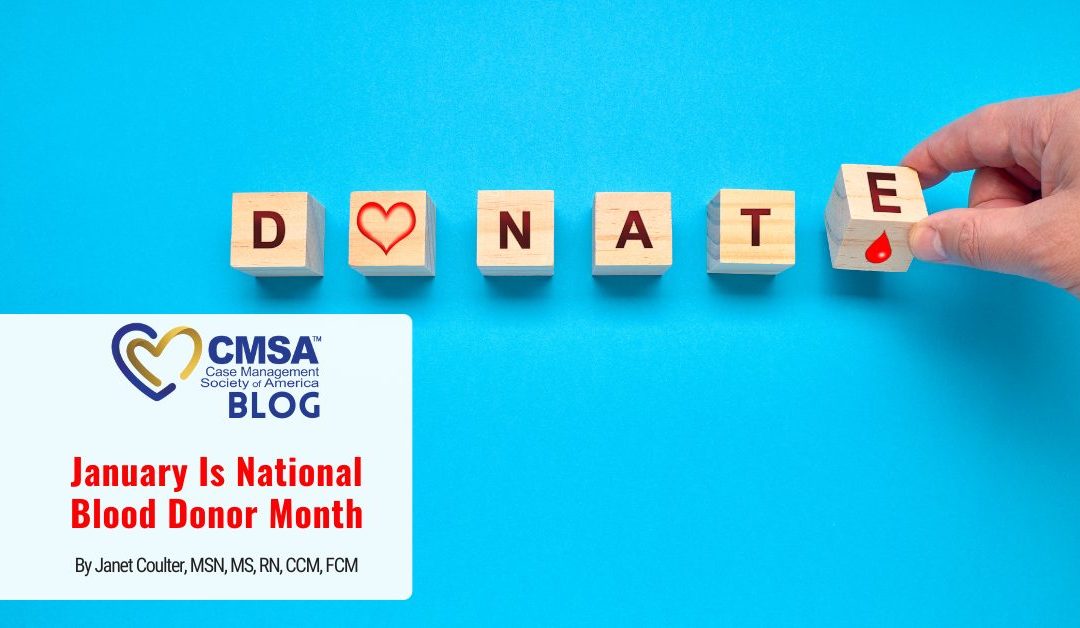By Janet Coulter, MSN, MS, RN, CCM, FCM
January is National Blood Donor Month.
Right now, there is a critical need for all types of blood, especially type O. Winter weather, cold and flu season, and a busy holiday season can affect the number of blood donors. A decrease in these lifesaving donations increases the risk of blood shortages. In the United States, approximately 29,000 units of red blood cells are needed every day. 5,000 platelet units and 6,500 units of plasma are also needed.
The American Red Cross and the National Football League are urging people to make blood or platelet donations. Anyone who donates blood between January 1-31, 2024, will automatically be entered to win a trip for two to the Super Bowl in Las Vegas. This is their way of thanking you for helping during the critical post-holiday time. In addition to enjoying the Super Bowl LVIII in Las Vegas, the winner and guest will have access to in-stadium pre-game activities, tickets to the official Super Bowl Experience, round-trip airfare to Las Vegas, three-night hotel accommodations, and a $1,000 gift card for expenses.
It only takes 45-60 minutes for the blood donation process. Apheresis takes longer than that of a whole blood donation. An apheresis donation can take one to two hours, depending on the blood component(s) that is being donated. During a whole blood donation, approximately 0.5 L of blood is collected. One unit of blood can be separated into four components that could help many people. Red blood cells can be extracted and used to treat patients recovering from surgery or trauma. Plasma can be given to patients to improve blood clotting. Platelets can be used in the treatment of patients with cancer or those undergoing organ transplants. Cryoprecipitate anti-hemophilic factor (AHF) can be used for treating clotting disorders.
Red blood cells may be refrigerated for a maximum of 42 days, or frozen for up to 10 years. Platelets, which are stored at room temperature, may be kept for a maximum of five to seven days. Fresh frozen plasma can be kept frozen for up to one year. Cryoprecipitate AHF can be stored frozen for up to one year. Granulocytes must be transfused within 24 hours of donation.
All donors are screened before donation. Aspirin and ibuprofen will not affect a whole blood donation. Apheresis platelet products can be affected if aspirin or aspirin products are taken 48 hours before donation. Many other medications are acceptable.
The Association for the Advancement of Blood and Biotherapies (AABB), the America’s Blood Centers (ABC) and the American Red Cross (ARC) state all blood donations from individuals who have received a COVID-19 vaccine approved or authorized for use in the U.S. are safe for transfusion.
There is a risk of passing a vaccine virus to others following vaccination with certain, live attenuated, viral, and bacterial vaccines. AABB Standards for Blood Banks and Transfusion Services recommend waiting before donating blood following these vaccinations:
Two weeks for live attenuated, viral, and bacterial vaccines (Measles (rubeola), Mumps, Polio (Sabin/oral), Typhoid (oral), and Yellow Fever.)
Four weeks for live attenuated, viral, and bacterial vaccines (German measles (rubella) and Chickenpox/shingles (varicella zoster)).
AABB recommends no waiting period after receipt of:
COVID-19– SARS-CoV-2 nonreplicating, inactivated, or mRNA-based vaccine.
Jynneos Smallpox/Monkeypox vaccine (attenuated, live, nonreplicating vaccine)
Anthrax, Cholera (inactivated), Diphtheria, Hepatitis A, Hepatitis B, Influenza, Lyme disease, Paratyphoid, Pertussis, Plague, Pneumococcal polysaccharide, Polio (Salk/injection), Rabies, Rocky Mountain spotted fever, Tetanus, Typhoid (by injection) if the donor is symptom-free and afebrile.
Recombinant vaccine HPV and Zoster Recombinant, Adjuvanted (Shingrix) Vaccine.
Intranasal live attenuated flu vaccine
Vaxchora (live attenuated, non systemically absorbed, oral Cholera vaccine)
A blood donation is an altruistic lifesaving gift you can give to others. By donating blood, you are helping others in your community. This unselfish act can also be a way of “paying back” for the times when you or your family or friends have needed blood transfusions in the past.
Please schedule your blood donation appointment today!
If you are unable to donate, try to recruit a donor, or volunteer at the blood bank or a bloodmobile. Monetary donations are always appreciated.
Blood donations can be scheduled by using the Red Cross Blood Donor App, visiting RedCrossBlood.org, or calling 1-800-RED CROSS (1-800-733-2767).
CMSA Case Management Boot Camp! WHEN: March 8-10, 2024 WHERE: Nashville, TN - Explore ethical practices, healthcare reimbursement, versatile skill sets, communication techniques, and more over two and a half days of in-person instruction. Register Now to Elevate Your Case Management Skills: https://cmsapmg.wpenginepowered.com/cmsa-boot-camp/
Bio: Janet Coulter, MSN, MS, RN, CCM, FCM, is a transplant case manager with a wide variety of experiences, including educator, administrator, team leader, and Director of Case Management. Janet holds a Master of Science in Nursing from West Virginia University and a Master of Science in Adult Education from Marshall University. She has published many articles in CMSA Today and the Professional Case Management Journal and served as a reviewer for the Core Curriculum for Case Management Third Edition. She serves as Chair of the CMSA Today Editorial Board and Secretary of the CMSA Foundation board. Janet received the CMSA National Award of Service Excellence and Southern Ohio Valley CMSA Case Management Leadership award and was recently inducted as a Case Management Fellow from CMSA. Janet has been active in CMSA at the national and local levels. She is currently the President-Elect of CMSA National, Chairperson of the Editorial Board of CMSA Today, Chairperson of the Nominations Committee, and Vice-President of the CMSA Foundation.

